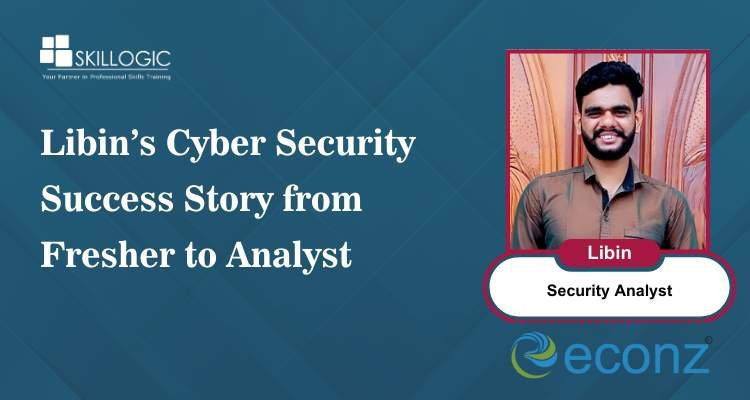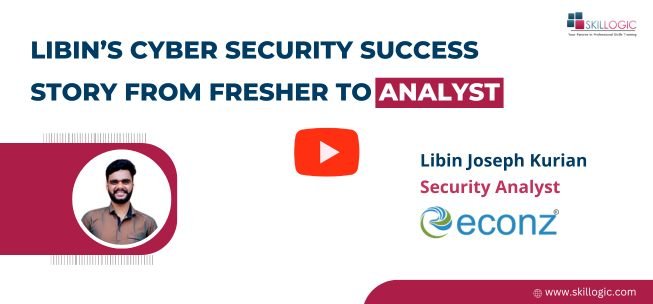Libin’s Cyber Security Journey: From Fresher to Security Analyst
Discover Libin’s Cyber Security Journey: From Fresher to Security Analyst, where he navigates the challenges of breaking into cybersecurity, gaining hands-on experience, earning certifications, and landing a security analyst role. Learn valuable insights for launching your own cybersecurity career.

Libin’s journey into cyber security was filled with challenges, learning experiences, and determination. Starting as a fresher with minimal industry knowledge, he worked his way up to becoming a security analyst. His dedication to acquiring practical skills, mastering essential tools, and preparing strategically for interviews played a crucial role in his success.
With the right guidance from SKILLOGIC, he gained hands-on training and industry exposure, which ultimately helped him secure a cyber security job at Econz as a Security Analyst. In this article, he shares his experience, insights, and valuable advice for aspiring cybersecurity professionals.
From BCA Graduate to Security Analyst: Libin’s Cyber Security Journey
Here’s an inside look at Libin’s journey into cyber security. He shares his training experience, interview challenges, and how he secured his role.
Q1: How did your journey into cyber security begin?
Before stepping into cyber security, I was a Bachelor of Computer Applications (BCA) graduate. My degree covered the fundamentals of various domains, including programming and cyber security , but only at a basic level. When I decided to pursue a career in cyber security , I enrolled in a specialized training program to gain in-depth knowledge and practical skills.
Q2: Why did you choose a cyber security course, and how did it help?
I joined the cyber security course to build a strong foundation and gain hands-on experience. The training at SKILLOGIC provided me with knowledge of various cyber security tools, techniques, and real-world applications. The placement team also played a crucial role in helping me land a job.
Q3: Was your training online or offline? How was your experience?
I opted for offline training, attending classes regularly. The sessions were structured well, lasting about an hour each. The trainers were highly knowledgeable and provided in-depth explanations. They also prepared us for interview questions, which was extremely beneficial during job interviews.
Q4: How was your classroom experience at SKILLOGIC?
The classes were conducted regularly, each lasting around one hour. My trainers, Fatima Ma'am and Abbas Sir, played a significant role in guiding me through the learning process. They covered both theoretical and practical aspects, ensuring we understood real-world applications. Many of the interview questions I faced were directly covered in our training sessions.
Q5: What was your learning process outside the classroom?
Practice was a crucial part of my learning journey. Simply attending classes was not enough; I dedicated extra time to practicing the tools and techniques taught. My trainers emphasized the importance of hands-on learning, and I made sure to clear my doubts during the next session to avoid gaps in my understanding.
Q6: How did you prepare for job interviews during the course?
The trainers emphasized practical learning, where we practiced tools daily. Clearing doubts immediately was essential, as I learned from my first failed interview. The placement assistance team provided mock interviews, resume-building support, and guidance on how to approach technical rounds.
Q7: Can you share your first interview experience?
My first interview was with a cyber security company in Hyderabad. I cleared the HR round, which was a simple telephonic conversation. However, I struggled with the technical round because it focused on penetration testing, which I wasn't fully prepared for. This experience taught me to prepare according to the job description, focusing on the specific skills mentioned.
Q9: How did you succeed in your second interview?
After learning from my first interview, I focused on understanding the job description thoroughly. The second interview was with a cloud security company in Bangalore. It had three rounds: an HR round to assess communication skills, a technical round, conducted by the hiring manager with a mix of Q&A and scenario-based questions, and a culture fit round which was a discussion with the VP to understand my long-term career goals. I was well-prepared and confident, which helped me secure the job.
Q10: What cyber security skills and tools did you learn?
During the training, we practiced around 38 to 40 tools. However, for interviews, it is important to focus on the most relevant 8-10 tools based on the current industry trends. Additionally, projects played a crucial role in my learning, as interviewers often asked about them in detail.
Q11: What kind of placement assistance did you receive?
The placement team at SKILLOGIC provided great support. They assisted me with resume building, interview preparation, and mock interviews. My placement assistance started in August, and I was shortlisted for interviews with two companies, one in Hyderabad and another in Bangalore. Eventually, I secured a job in Bangalore in a cybersecurity role focused on cloud security.
Q12: Any advice for freshers looking to enter cyber security ?
Here are my key tips for building a successful cyber security career. Start by carefully studying the job description and preparing accordingly. Focus on developing practical skills and mastering essential cyber security tools. Taking mock interviews seriously can significantly boost your confidence. It’s also important to work on real-world projects and gain a thorough understanding of them. Continuous learning and regular practice will help you stay updated with the latest cyber security trends. Transitioning from a fresher to a security analyst was a challenging but rewarding journey. With the right training, practice, and dedication, anyone can establish a strong career in cyber security.
Refer these articles:
Highlights from Libin’s Cyber Security Journey
With the right training and support from SKILLOGIC, Libin gained industry-relevant skills and secured his dream role. Here are the key highlights of his journey:
- Hands-on Training Matters: Practical experience and real-world applications are crucial for success.
- Offline Training Benefits: Regular in-person sessions helped with structured learning and immediate doubt resolution.
- Interview Preparation is Key: Mock interviews, resume support, and technical guidance played a vital role.
- Learning from Failure: His first failed interview taught him to prepare according to job descriptions.
- Focused Skill Development: Mastering 8-10 essential cyber security tools is more effective than learning too many.
- Multiple Interview Rounds: HR, technical, and culture-fit rounds are common in cyber security hiring processes.
- Continuous Learning is Essential: Staying updated with industry trends and improving skills ensures long-term success.
- Placement Assistance Works: Support from the placement team from SKILLOGIC helped him land his role at Econz.
- Determination Pays Off: With the right training, preparation, and dedication, anyone can transition into cyber security.
Refer these articles:
- How to Choose the Best Institute for Cyber Security in Bangalore
- How to Choose Best Institute for Cyber Security in Hyderabad
- How much is the Cyber Security Course Fees in Bangalore
Libin’s journey from a fresher to a Security Analyst at Econz showcases the power of dedication, practical learning, and the right training. With hands-on experience from SKILLOGIC, he gained industry-relevant skills, overcame interview challenges, and secured his dream job.
His story highlights the importance of continuous learning, mastering essential tools, and strategic preparation. For aspiring cyber security professionals, his experience proves that with determination and the right guidance, building a successful career in cyber security is absolutely achievable.
If you're looking for a cyber security institute in Bangalore, you might also explore training options in Chennai, Hyderabad, Pune, Ahmedabad, Mumbai, Coimbatore, Delhi, Kochi, and Kolkata. As per the Fortune Business Insights, the global cybersecurity market, valued at USD 172.24 billion in 2023, is expected to reach USD 562.72 billion by 2032, highlighting a massive rise in demand.
This surge is also creating more opportunities in India, where the need for skilled cyber security professionals is growing rapidly. To meet this demand, leading institutes across major cities offer offline and classroom-based courses, equipping learners with job-ready skills.
SKILLOGIC is a top institute in India, offering comprehensive cyber security training designed to prepare students for the evolving digital landscape. Whether you prefer classroom or online learning, SKILLOGIC provides flexible training options to suit different needs. With over a decade of experience and more than 100,000 trained professionals worldwide, it is a trusted name in cyber security education.
At SKILLOGIC, students gain hands-on training, expert mentorship, and globally recognized certifications from NASSCOM FutureSkills and IIFIS. The institute also provides 24/7 access to cloud labs, internships, and placement support to help students start their careers.
The Cyber Security Professional Plus course blends expert-led training with real-world simulations, ensuring industry-ready skills. Available as offline cyber security institute in Hyderabad, Bangalore, Chennai, Pune, Mumbai, Coimbatore, Ahmedabad, and online, SKILLOGIC helps professionals stay ahead in the fast-evolving cyber security field.


0
134